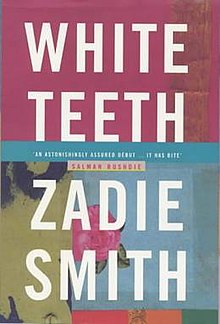White Teeth

First edition
|
|
| Author | Zadie Smith |
|---|---|
| Country | United Kingdom |
| Language | English |
| Publisher | Hamish Hamilton |
|
Publication date
|
27 January 2000 |
| Media type | Print (Hardcover) |
| Pages | 480 pp |
| ISBN | |
| OCLC | 43501880 |
| 823/.914 21 | |
| LC Class | PR6069.M59 W47 2000b |
White Teeth is a 2000 novel by the British author Zadie Smith. It focuses on the later lives of two wartime friends—the Bangladeshi Samad Iqbal and the Englishman Archie Jones—and their families in London. The novel is centred around Britain's relationships with people from formerly colonised countries in Africa, Asia, and the Caribbean.
The book won multiple honours, including the 2000 James Tait Black Memorial Prize for fiction, the 2000 Whitbread Book Award in category best first novel, the Guardian First Book Award, the Commonwealth Writers First Book Prize, and the Betty Trask Award. Time magazine included the novel in its TIME 100 Best English-language Novels from 1923 to 2005.
On New Year's Day 1975, an Englishman named Archie Jones, a 47-year-old man whose disturbed Italian wife has just walked out on him, is attempting to commit suicide by gassing himself in his car when a chance interruption causes him to change his mind. Filled with a fresh enthusiasm for life, Archie flips a coin and then finds his way into the aftermath of a New Year's Eve party. There he meets the much-younger Clara Bowden, a Jamaican woman whose mother, Hortense, is a devout Jehovah's Witness. Clara had been interested in the unattractive, anti-social Ryan Topps, but their relationship falls apart after Ryan becomes a member of the Jehovah's Witnesses. Archie and Clara are soon married and have a daughter, Irie, who grows up to be intelligent but with low self-confidence.
Also living in Willesden, North-West London, is Archie's best friend Samad Iqbal, a Bengali Muslim from Bangladesh; the two men spend much of their time at the O'Connell's pub. Archie and Samad met in 1945 when they were part of a tank crew inching through Europe in the final days of World War II, though they missed out on the action. Following the war, Samad emigrated to Britain and married Alsana Iqbal, née Begum, in a traditional arranged marriage. Samad is a downtrodden waiter in a West End curry house, and is obsessed by the history of his great-grandfather, Mangal Pandey, who allegedly fired the first shot of the Indian Rebellion of 1857 (and missed). Samad and Alsana have twin boys, Magid and Millat, who are the same age as Irie. Samad in particular finds it difficult to maintain his devotion to Islam in an English life; he is continually tormented by what he sees as the effects of this cultural conflict upon his own moral character – his Muslim values are corrupted by his masturbation, drinking, and his affair with his children's music teacher, Poppy Burt-Jones. In an attempt to preserve his traditional beliefs, he sends 10-year-old Magid to Bangladesh in the hope that he will grow up properly under the teachings of Islam. From then on, the lives of the two boys follow very different paths. Ironically, and to Samad's fury, Magid becomes an Anglicised atheist and devotes his life to science. Millat, meanwhile, pursues a rebellious path of womanising and drinking – as well as harbouring a love of mob movies such as The Godfather and Goodfellas. Angry at his people's marginalisation in English society Millat demonstrates against Salman Rushdie in 1989 and eventually pledges himself to a militant Muslim fundamentalist brotherhood known as "Keepers of the Eternal and Victorious Islamic Nation" (KEVIN).
...
Wikipedia
